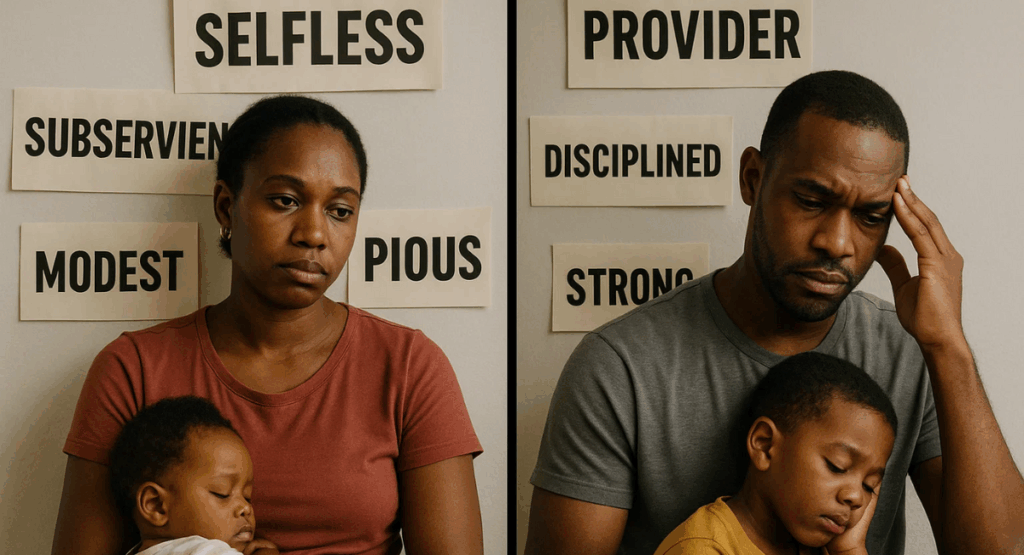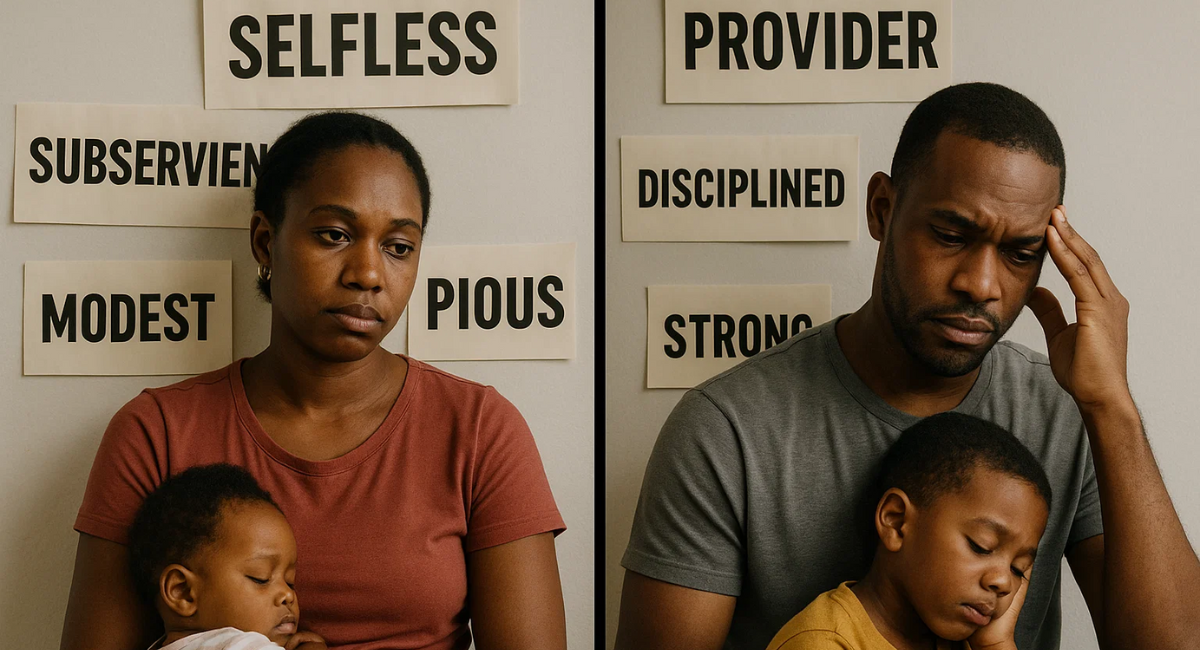The Myth of the Good African Man & Woman

In every African community, stories are passed down. Stories of what a woman should be. What a man should do. How they should love, live, and behave. These stories come dressed as wisdom, told by aunties, elders, uncles, pastors, and even songs. They shape our hearts before we know how to speak for ourselves. But a lot of these stories aren’t real; they’re ideas. People keep repeating them, not because they’re true, but because they’re familiar. They are myths. And when we swallow them without question, they leave behind quiet damage. Here are 10 ways this myth continues to haunt the African home and why we must begin telling new stories.
Download Pendova on Google Playstore:

iOS Users can access Pendova app on web.pendova.com
1. Social Conditioning
A little girl is told to kneel when greeting. To never talk back. To smile through discomfort. She’s been taught to cook before she’s ever been taught to say no. A boy is taught to pay the bills, hide his fears, and protect his sisters, but never his own heart. These roles weren’t born in them. They were repeated so often, praised so loudly, that they started to feel like part of who they were.
No one asked them what they wanted to be. They were prepared to fit into society’s box. Not because they were incapable of more, but because tradition often fears choice. So, generations wear a script they didn’t write and still get blamed when the story fails.
2. Endurance vs Strength
“She’s such a strong woman; she stayed even after everything.” How often do we hear that? But what if she didn’t want to stay? What if she stayed because there was no other option, no income, no support, no space to say “I’m tired”? Many women are praised for surviving what should’ve broken them. Men are praised for holding up the world, even when it’s crushing them inside.
This version of strength becomes dangerous. It rewards people for staying in unhealthy situations. It turns suffering into a badge of honor. But strength should not mean losing yourself. True strength is having the freedom to say, “This isn’t working for me.”
3. Unseen Sacrifice
In a lot of African homes, love is often seen in what you’re willing to let go of. A woman sacrifices her body during childbirth, her time raising children, her sleep, and her sanity. A man sacrifices his rest, his peace, his dreams, just to keep food on the table. But rarely is that sacrifice truly seen. It’s just expected. And if you choose not to, people say you’re selfish.
The problem isn’t in giving. It’s about being taken for granted. Being a good partner should not mean burning yourself to keep others warm. Sometimes, people don’t even want to be thanked; they just want to be seen. To be asked, “Are you okay?”
4. Transactional Love
In too many relationships, love isn’t something you feel. It’s something you earn. A woman is loved if she keeps quiet, respects his family, and raises the children well. A man is loved if he provides, doesn’t cry, and doesn’t fall. Love becomes a contract with invisible terms. Step outside the script, and you risk being unloved.
But real love doesn’t come with a checklist. It grows in freedom, not control and holds space for mistakes. It listens when someone says, “I’m changing.” Love without conditions is scary for those raised to perform for affection. But that’s the only love that truly heals.
5. Perfection Pressure
It’s not about being perfect. It’s about making sure no one sees your flaws. The good woman must never show too much skin, raise her voice, or admit she’s had a past. The good man must not cry in public, be too sensitive, or show emotional need. One small “flaw,” and your entire character is judged.
This pressure kills real intimacy. People stop showing their true selves out of fear. So they lie. They hide. They pretend. And over time, they even forget who they are. But real connection starts with imperfection. Sometimes, it just begins with the courage to say, ‘I’m not strong all the time, and I still want to be loved.
6. Physical Double Standards
Across much of the continent, women are taught to be ashamed of their bodies. If she understands her own body or speaks openly about sex, people quickly judge her. If she expresses desire, she’s “spoiled.” Men are allowed to explore, while women are punished for the same thing. Girls are taught to stay quiet, while boys get away with it because ‘that’s just how boys are.’
This creates marriages where people cannot talk about sex without fear or shame. It builds relationships where women feel guilt instead of joy, and men feel pressure instead of peace. But sexuality isn’t dirty. It’s part of being human. We cannot raise whole people by teaching them to fear their bodies.
7. Cultural Restraints
Tradition should hold us, not choke us. But in many places, culture is used as a weapon. A woman is told she must marry before 30 or she’s wasted. A man is told he must earn more than his wife, or he’s not a man. Even when these ideas no longer serve us, people still cling to them out of fear. But tradition is not truth. It’s a habit passed down. If it no longer fits the world we live in, it must evolve. Otherwise, it becomes a prison that silences love, stifles freedom, and breeds resentment.
8. External Validation
The good woman is not the happy one. She’s the one whose in-laws approve of her. The good man is not the one who is kind, but the one who is feared or obeyed. You can be miserable, unfulfilled, and invisible, but still be called “good” because you checked all the public boxes.
We need to stop measuring goodness through the eyes of others. True goodness starts within. It shows in how you treat people, how you love, and how honest you are. Not in how well you perform for the crowd. Because when you chase their version of good, you lose your own voice.
9. Emotional Pretending
Behind every “perfect” marriage photo is someone swallowing sadness. Behind every “power couple” caption is someone feeling unseen. People pretend not because they’re fake, but because they’re scared. Scared to be called failures. Scared to disappoint family. Afraid to speak the truth because deep down, they’re just tired of the myth.
So we smile in wedding pictures. We cook when we’re broken. We provide when we’re struggling. But how long can people keep pretending before something inside them breaks? Let’s stop romanticizing quiet suffering. Let’s start normalizing honesty.
10. Misplaced Protection
The idea of the “good African man” or “good African woman” often shields the ones causing harm. Abusive husbands are excused because they pay the bills. Controlling wives are praised for keeping their men “in line.” The myth doesn’t just burden those trying to be good. It protects those pretending to be. It keeps people trapped in roles where they cannot speak up without being blamed. People say she wasn’t respectful enough, or that he should’ve just manned up. This shifts the focus from what’s right to what looks right. And in doing so, it lets damage hide behind titles like provider, wife material, or head of the home.
Final Note
This myth has lived too long. It has shaped too many lives, stolen too much joy, and buried too many voices. Across Africa, men and women are quietly suffering under the weight of roles they never chose, pretending, performing, pushing through, just to be called “good.” But goodness should not be a costume you wear to please others. It should show up in how you live when no one’s around to applaud you.
The time has come to stop praising quiet suffering and start celebrating honest living. An African man shouldn’t have to be strong all the time just to prove he’s enough. An African woman shouldn’t have to break herself just to be seen as lovable. We are allowed to change. To grow. To drop the myths and write stories that are softer, truer, and more alive. Because no matter what culture says, being human will always be more important than being “good.”
Follow our Social Medias:







